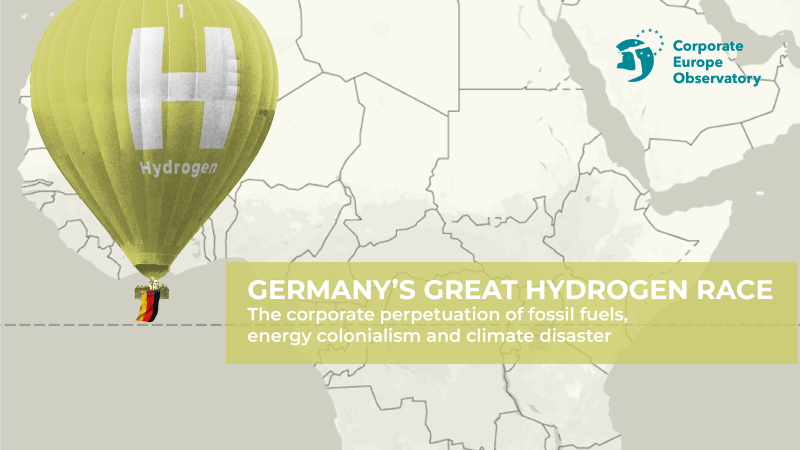Stay always informed
Interested in our articles? Get the latest information and analysis straight to your email. Sign up for our newsletter.

A few days before the European Gas and Hydrogen Conference takes place in Vienna a new investigative report by lobby watchdog Corporate Europe Observatory (CEO) maps Germany's 'brave new hydrogen world'. Which looks a lot like the old world: prolonging fossil fuel use and continuing its extractivist logic. We show who is driving the German – and thus EU – hydrogen hype, who benefits, and the negative impacts for prospective green hydrogen export countries.
'Germany's great hydrogen race: The corporate perpetuation of fossil fuels, energy colonialism and climate disaster' shows how hydrogen is being used as a Trojan horse to prolong the use of fossil fuels. The investigative report finds that the current German – and by extension European – hype around hydrogen as the cornerstone of a much needed energy-transition is largely the result of a huge multi-million lobby-operation by hydrogen and dirty energy companies, industry associations and consultancies. Behind the hype, this hydrogen push will actually lead to higher CO2 emissions
More than 100 German businesses - many from or with ties to the fossil fuel and other polluting industries - are jumping on the hydrogen bandwagon to lock in harmful infrastructure like gas pipelines used for fossil fuels. Germany's hydrogen lobby successfully spends millions influencing politics, with an army of lobbyists. Last year high-ranking German government officials met with gas lobbyists on average once a day.
The new investigative report comes a week after the launch of the EU Hydrogen Bank, to foster hundreds of billions in investments, and a few days after 'the last call for climate action' by the Intergovernmental Panel on Climate Change (IPCC).
The hydrogen hype ignores these dirty facts:
More and more experts warn that an energy economy focused on hydrogen will actually increase emissions. Expert government advisory body the German Advisory Council on the Environment states hydrogen "cannot play an overarching role" in solving the climate crisis.
The EU should immediately revise its hydrogen strategy, scrap its unrealistic import targets and vastly increase investment in energy efficiency and real and just renewables, to reduce dependency on gas and tackle energy poverty.
Belén Balanyá, Researcher and Campaigner at Corporate Europe Observatory (CEO), said:
"Just when the IPCC repeats fossil fuels must go urgently, it's outrageous that the EU and Germany are pushing for hydrogen in such a massive and uncritical way, using inflated and unrealistic figures. Hydrogen is yet another dangerous distraction, and a lifeline for fossil fuel companies. Just because you put the word 'green' in front of an energy source doesn't make it sustainable or fair."
"A big chunk of the green hydrogen that the EU plans to use will be imported from North Africa and the Middle East. While the EU is in bed with the gas industry and big corporations – who are steering the continent's response to the energy crisis – it's ordinary citizens in Europe and North Africa who will bear the brunt of this deeply flawed hydrogen strategy."
ENDS
Other key findings:
1. The hydrogen lobby co-drafted the German H2Global public funding scheme. This scheme arose from the Business Alliance for Energy, an industry-only forum created by the German Ministry for Economic Development and Cooperation. The German government has allocated more than €4 billion to the funding scheme to spur green hydrogen exports to Germany.
2. The German government's main hydrogen advisory body, the National Hydrogen Council, is dominated by corporate lobbyists who steer hydrogen policy in the interest of their profits.
3. Germany's recent shift to blue hydrogen has been one of the lobby's biggest wins. The updated strategy, appears to shift to promote the use and public funding of fossil-derived blue hydrogen.
4. Germany has established hydrogen alliances and partnerships with at least 26 potential export countries, many of them in the Global South. Berlin plans to cover two-thirds of its future green hydrogen demand with imports and is set to become Europe's biggest importer of the gas, with an estimated 60 to 70 per cent share of the future EU/UK import demand. German corporations are keen participants in this global quest, and accompany ministers whenever they go on hydrogen missions.
5. German-backed green hydrogen projects abroad follow colonial patterns. Resources and locally produced renewable energy are appropriated while ecological damage and energy scarcity are conveniently outsourced. Conflicts over land and water use are already becoming apparent and could intensify over the next years.
6. A shocking example of human rights violations connected with green hydrogen is Saudi Arabia's planned megacity Neom, where Thyssenkrupp will install a huge electrolyser to produce hydrogen for export. Local tribes have been forcibly evicted from their land to make way for Neom. One protester was killed and several sentenced to death for resisting eviction.
7. Hydrogen projects in the Global South tend to be centralised mega projects and lack civic participation. A mapping of 27 mostly African countries could not identify a single hydrogen project in which the community was consulted prior to the decision to proceed with the project. A small group of political and economic elite is likely to profit from these top-down processes, reproducing the toxic extractivist logic of fossil fuels.